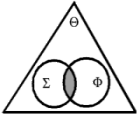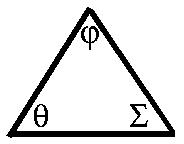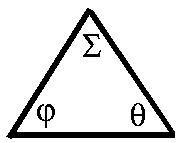Previous . Next
Catholic Epistemology
Since I was educated in a protestant seminary, I'm not at all able to
explain the last 300 years of the Roman Catholic Church. However, the word
"catholic" means "all-encompassing, general" so one might argue that these
are the views of the majority of Christianity.
Augustine
Saint Augustine was the giant of the early church. Educated in Greek
philosophy, he nonetheless forsook a promising career in philosophy to
pursue religion. His contributions are multiple, not the least of which was
his understanding of knowledge (or "science" for this course).
faith ==> science ==> faith
There is a lot of profound emphases in this little statement.
- It's iterative, cyclic. They build on each other. The whole history of
science might be seen as an unfolding of this cycle. Stanley Jaki argues
that science could only have developed where Christianity had previously
shown the way.
- All the advances of modern physics, biology, computer science, etc,
cannot undermine faith. Think about it a moment. Augustine is saying
that knowledge, say of Darwin's evolution, can only enrich faith. Or that
faith in miracles, such as seeing Jesus walk on the water, only serves to
enhance science.
- This view then, fits neither the separation view [o o], nor the
incorporation views, rather it fits better with the overlapping view
[OO].
Augustine focusses a lot on logic. Neo-Platonism sees the nature of Reality
as embodied in God's word. That is, Nature is not god or a god, but a direct
expression of God. As McGrath puts it, there are only 3 views on nature:
it is divine; it is a product of divinity; it is neither divine nor a
product of divinity. Augustine adopts the middle view, which is most
consistent with the overlapping Venn diagram:
 Jaki argues that this position is the only way that science can avoid the
extreme pitfalls. To the right lies superstition. To the left is chinese
medicine. Only down the center is real science possible. As we have
discussed earlier, one has to hold the reality of the world out-there as
certain, while holding our view of that reality as hypothetical, and subject
to change, in order for science to progress.
Jaki argues that this position is the only way that science can avoid the
extreme pitfalls. To the right lies superstition. To the left is chinese
medicine. Only down the center is real science possible. As we have
discussed earlier, one has to hold the reality of the world out-there as
certain, while holding our view of that reality as hypothetical, and subject
to change, in order for science to progress.
Aquinas 
Medieval scholastics struggled with both understanding faith and science
together. One of the issues that divided them was the tradeoff between
"reason / experience" and "revelation". That is, proofs of God's existence
get you up to only the first stage of Aquinas' two stage world. In the end,
after exhausting all our attempts to understand the universe with our own
abilities, we need the extra-ordinary revelation of God to comprehend the
order. Revelation is required because God is not constrained to be logical,
or perhaps, our finite understanding cannot constrain God.
 This two stage approach can be seen to persist in arguments today, just
replace the Christianity with "Truth" or "Order". For example, in arguments
about "change being inevitable", one should ask why this motto should remain
unchanging.
This two stage approach can be seen to persist in arguments today, just
replace the Christianity with "Truth" or "Order". For example, in arguments
about "change being inevitable", one should ask why this motto should remain
unchanging.
Enlightenment Rationalism
During the Renaissance many took exception to this division. SOme argued
that Reason was king.

This is
what was implied by Descartes famous dictum "Cogito ergo sum." He even
writes a passage in which he divorces knowledge of God from either science
or divine revelation.
This approach to science is highly theoretical, and should you talk to a
theorist, makes perfect sense. Paul Davies book "God and the New Physics"
makes this point exactly--the theory of everything. But what is forgotten is
how often the theorists are wrong! (Sort of like Babe Ruth's record number
of strikeouts.) For example, Kant had an astronomy book that was laughable.
Hegel figured out how many planets there should be based on logic. So in the
end, Reason as king falters for all the same reasons.
Empiricism
As an alternative we have finally empiricism. John Locke's view of the
world.

Here we have much of the lore of the illusive "empirical method",
Observations -> Data -> Hypothesis -> Testing . The problem, of course, is
that very little science follows this pattern. As Thomas Kuhn points out in
his "Structures of Scientific Revolutions", scientific methods do not ever
overturn old theories or create a groundswell for new theories. Rather, they
are a weak support for established theories that amount to a bit of
maintenance. One doesn't build a skyscraper with a dustpan and broom, but
one maintains it with those tools after it has been built.
Religious Epistemology
Success of German Criticism
German liberalism was enormously successful, overtaking all the protestant
seminaries in Europe, and making deep inroads into the more conservative
American seminaries. The reasons for this success might include the
following:
- Scientific. It supposedly was more objective and scientific because it
had an emphasis on the original languages of Greek and Hebrew. This
linguistic analysis was used to critique and remove the (unjustified,
blind-faith) support for an inerrant Bible.
Critique--why shouldn't linguistic analysis *support* inerrancy of
Scripture, as is the example at many conservative seminaries such as the one
I graduated from, rather than deny it? Was linguistic analysis really
"objective", or was it a neutral tool that could be used by any analyst to
support their previously held bias?
- Humanist. The trend in the culture was to elevate humanism in all
aspects of the human endeavor--arts, sciences, government, education etc. So
a religion that was man-centered, that elevated human experience meshed
perfectly with the "spirit of the age" the zeitgeist of the 19th century.
Critique--if religion absorbed its emphases from culture, how can it in
any sense provide leadership or direction or moral authority to culture? The
phrase used about Unitarians (a highly humanistic derivative of the
Puritans) was that it emphasized "the Fatherhood of God, the Brotherhood of
Christ in the Neighborhood of Boston".
- Progressive/Rational. The cultural expectation was that Logic and
Reason alone led one to real Truth, and that the direction of mankind was
toward higher and more refined existence. Thus one just expected that
traditions would be found too limiting and irrational for modern belief,
that the new was inherently better than the old.
Darwin's impact
So when Darwin's 1859 Origins book arrived on the scene, it gave a
humanist, anti-miraculous or naturalist answer to the theological question
"Why are we here?", "Where did we come from?" and "Where are we going?". In
England in 1860, the year after, a group of Anglican clergymen wrote a
collection of articles called "Essays and Reviews" in which they assented
with Darwin and presented a clearly humanist view of the church. This
movement became known as "Broad Church" in England. America, with its
Anglophile preachers, imported it to the colonies and for example Henry Ward
Beecher in N.Y.C popularized this approach.
Not everyone got on the bandwagon, however, one theologian at Princeton
Seminary (then a conservative seminary in America--you've heard my story
about its founding) named Charles Hodge correctly saw that the potential
heresy of Darwinism lay not in its claim of common descent (e.g. that humans
may be descended from monkeys), but rather in its view of natural selection
occurring only by chance. This aspect, he argued, made a dramatical break
with Christianity. All the accomodation of religion to Darwinism couldn't
remove this crucial difference with Christianity. It was either God or
Chance.
So among conservatives, there was consensus that Darwinism wasn't
Christianity, but many in the liberal elite flirted with variations on a
theme. Theistic Evolution, Evolution as evidence of God's interaction with
life, etc. What changed this rosy picture was World War I. The effect was,
for obvious reasons, much more dramatic in Europe than in America.
World War I
Remember, the three pillars of German liberalism were:
- Higher Criticism--elevation of man's (unspoiled) intellect
- Experience--the elevation of man's (enlightened) spiritual
experiences
- Ethics--the elevation of man's noble (unsoiled) rational love
Implicit in all of these is a highly optimistic view of man, society and
nature. Thus WWI was a devastating blow. Several books have tried to show
links between Darwinism, and in particular his view of "survival of the
fittest" as applied to society, and WWI. Vernon Kellog, and Benjamin Kidd
both argue in their books that the German militarism that led to WWI was
fueled by "social Darwinism". The link with Nietzche was even stronger, but
made more explicit in WWII. Thus there was not only a theological reaction
to liberal theology, but a sociological reaction to a foreign philosophy
that had just destroyed Europe. Who would want to import this explosively
dangerous philosophy into America? Wasn't WWI proof positive that such
innovations were dangerous and diabolical?
What were the consequences for conservative Christians? The first and most
immediate was a reactionary response. In the early 1910-1920 time frame,
conservatives published a series of articles in a collection called
"Fundamentals", listing the theological beliefs that could not be
compromised without loss of faith. The concept of making a collection of
definitive statements is nothing new, for over the centuries the church had
developed "creeds" that were succinct theological summaries intended to
capture the important issues of faith in response to some heretical
controversy. If one reads the Nicene Creed, written in 325 AD at the
Council of Nicea in response to the Arian Heresy, one has a hard time
understanding the issues involved "I believe in God the Father Almighty, ...
God from God, light from light, true God from true God..." (Nor could anyone
change the words of a creed, as exemplified in the Roman Catholic insertion
of a single adjective "filioque" that caused the split from the Orthodox
Church.) So it is entirely traditional, that in response to the (mostly)
protestant heresy of German liberalism, the conservatives developed a new
creed and allegiance to that creed made one a "fundamentalist".
A different tack was taken in Europe, as Karl Barth responded to the WWI
Prussian belt buckles that read "Gott Mit Uns", God with us, claiming divine
support for bloody war. He developed a theology known as Neo-Orthodoxy, that
stressed the utter transcendence of God, and the inability for culture or
theologians to accurately understand God, much less appropriate Him. While
very popular in the middle half of the 20th century, neo-orthodoxy seems to
have been absorbed back into the polarized conflict between conservatism and
liberalism. Nonetheless, we should not overlook the fact that Karl Barth
counter-attacked with a new theory of knowlege, with epistemology. The
understanding of absolutes, of truth, seems to be an important response to
liberalism on both continents, a topic I call religious
epistemology.
Religious Epistemology
Another approach to understanding the Fundamentalist movement, is to
consider the different ways that modern religious movements understand God.
I call this religious epistemology, because it makes some assumptions about
our understanding of God, absolutes and Truth. That is, it elevates one
particular way or method of knowlege over the others, leading to some
similarities that might not be expected.
Medieval Synthesis  ==> 3 options
==> 3 options
 RATIONAL: Liberal protestant, Deism, Unitarian
RATIONAL: Liberal protestant, Deism, Unitarian EXPERIENTIAL: Pietism, Pentecostalism, Revivalism, Hippy
EXPERIENTIAL: Pietism, Pentecostalism, Revivalism, Hippy CREEDAL: Neo-Orthodoxy, Fundamentalism (Roman Catholic?)
CREEDAL: Neo-Orthodoxy, Fundamentalism (Roman Catholic?)
The first solution emphasizes Rationalism. Only a rational God is possible.
De-mythologizing the Bible, a la Bultmann, is not only good but necessary.
(Strangely enough, I believe the National Socialism of Germany was a church
in this tradition, though how neo-paganism owes its roots to rationalism is
perhaps a longer tale.) The ECUSA church is a classic example of mainstream
church (like the Unitarians) pursuing this course. Problem: culture and
religion often come into conflict (as culture changes, teenagers take over
the world, technology advances...) so whenever there is a problem, the
rationalist modifies religion. Result: Nobody goes to church anymore. Its
irrelevant, trivial. There are competitors who offer more exciting ways to
achieve salvation, glory and fame...
The second solution adopts the credo "Don't slam it until you try it!"
Experience is everything. ("Once your consciousness is raised it can never
be lost...") The underlying assumption is that brains are optional, and
creeds are too binding. There should be no authority telling you what is
right, no analysis of what might be better than another, just a "try it,
you'll like it" attitude. Problem: since the fundamental absolute is based
on subjectivity, "experience" is God. It cannot be bought or remembered or
believed, but repeated and repeated and repeated as a sign and symbol of
salvation. Pietist or "holiness" churches emphasize the behavior patterns
that confer salvation (in contrast to doctrine). Pentecostals emphasize the
worship. As an example, my wife attended a moderately large (200 member)
Pentecostal church where she occasionally played the organ. Everyone loved
church services, tissues came out in abundance during the sermons, with
crying and emotional response to the message. When the pastor died (of
cancer), the church dwindled away to almost nothing. The experience was
everything except a permanent feature of the members.
The third solution emphasizes Creeds. You have to believe (assent to,
acknowlege, affirm to the point of death, etc.) certain statements. What are
these essentials? The Catholic Church, which some would call creedal, has a
Pope to tell us what is essential. The Pope (along with his college of
cardinals) rely on tradition to guide his statements. But what does the
Fundamentalist church have? They have their own equivalents. Naturally, they
have the ancient creeds: The Nicene Creed, the Apostles Creed, the
Chalcedonian Creed. They have the Reformation Confessions: the Westminster
Confession, the Augsburg Concordat, the 39 Articles, even an anti-Arminian
acronym TULIP. And they have their modern response: The Fundamentals, Darby
Dispensationalism (in Schofield's notes). Problem: the multiplication of
creeds becomes overwhelming, even separating otherwise like-minded people.
And what does one do with out-dated (e.g. Nicene) creeds?
Without going into all the details of religious epistemology and its effect
on the Religion vs. Science debate, we want to focus on that lightning rod
of American culture, the conflict between Fundamentalism and Naturalism in
the sciences.
Last modified, February 7, 2003, RbS
 Jaki argues that this position is the only way that science can avoid the
extreme pitfalls. To the right lies superstition. To the left is chinese
medicine. Only down the center is real science possible. As we have
discussed earlier, one has to hold the reality of the world out-there as
certain, while holding our view of that reality as hypothetical, and subject
to change, in order for science to progress.
Jaki argues that this position is the only way that science can avoid the
extreme pitfalls. To the right lies superstition. To the left is chinese
medicine. Only down the center is real science possible. As we have
discussed earlier, one has to hold the reality of the world out-there as
certain, while holding our view of that reality as hypothetical, and subject
to change, in order for science to progress.  This two stage approach can be seen to persist in arguments today, just
replace the Christianity with "Truth" or "Order". For example, in arguments
about "change being inevitable", one should ask why this motto should remain
unchanging.
This two stage approach can be seen to persist in arguments today, just
replace the Christianity with "Truth" or "Order". For example, in arguments
about "change being inevitable", one should ask why this motto should remain
unchanging.


 RATIONAL: Liberal protestant, Deism, Unitarian
RATIONAL: Liberal protestant, Deism, Unitarian EXPERIENTIAL: Pietism, Pentecostalism, Revivalism, Hippy
EXPERIENTIAL: Pietism, Pentecostalism, Revivalism, Hippy CREEDAL: Neo-Orthodoxy, Fundamentalism (Roman Catholic?)
CREEDAL: Neo-Orthodoxy, Fundamentalism (Roman Catholic?)